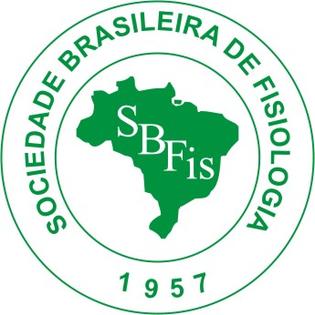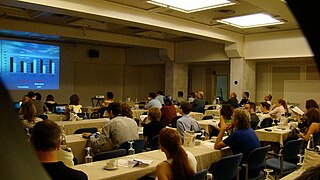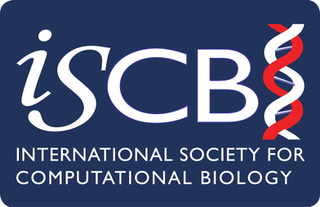 W
WThe American Phytopathological Society (APS) is an international scientific organization devoted to the study of plant diseases (phytopathology). APS promotes the advancement of modern concepts in the science of plant pathology and in plant health management in agricultural, urban and forest settings.
 W
WThe American Society for Biochemistry and Molecular Biology (ASBMB) is a learned society that was founded on December 26, 1906, at a meeting organized by John Jacob Abel. The roots of the society were in the American Physiological Society, which had been formed some 20 years earlier. ASBMB is the US member of the International Union of Biochemistry and Molecular Biology.
 W
WThe American Society for Microbiology (ASM), originally the Society of American Bacteriologists, is a professional organization for scientists who study viruses, bacteria, fungi, algae, and protozoa as well as other aspects of microbiology. It was founded in 1899. The Society publishes a variety of scientific journals, textbooks, and other educational materials related to microbiology and infectious diseases. ASM organizes annual meetings, as well as workshops and professional development opportunities for its members.
 W
WThe Australian Society for Fish Biology (ASFB) is a professional organisation of fish and fisheries researchers. Founded in 1971, the society describes itself as a "professional, independent, non-profit, non-commercial and non-aligned organisation." The Australian Society for Fish Biology holds annual conferences for its members, sometimes in partnership with related organisations such as the Oceania Chondrichthyan Society and the Australian Society for Limnology. Former presidents of the society include Hamar Midgley (1977–79), Gerry Allen (1979–81), Julian Pepperell (1991–93) and Bronwyn Gillanders (2012–13).
 W
WThe Behavior Genetics Association (BGA) is a learned society established in 1970 and which promotes research into the connections between heredity and behavior, both human and animal. Its members support education and training in behavior genetics; and publish Behavior Genetics, a journal on the topic.
 W
WThe Biophysical Society is an international scientific society whose purpose is to lead the development and dissemination of knowledge in biophysics. Founded in 1958, the Society currently consists of over 7,500 members in academia, government, and industry. Although the Society is based in the United States, it is an international organization. Overseas members currently comprise over one third of the total.
 W
WThe Brazilian Society of Physiology is a learned society and association of students and professionals in physiology in Brazil. It is a member of the Brazilian Federation of Experimental Biology Societies (FeSBE) and of the Brazilian Society for the Advancement of Science (SBPC). Internationally, it is the country's representative at the International Union of Physiological Sciences (IUPS) and at the Latin American Association of Physiological Sciences.
 W
WThe British Mycological Society is a learned society established in 1896 to promote the study of fungi.
 W
WThe British Society for Plant Pathology, or BSPP, is a UK-based organisation of British plant pathologists but accepts members from all countries. It was founded in 1981 and publishes three scientific journals: Plant Pathology, Molecular Plant Pathology and New Disease Reports. The BSPP has links to the International Society for Plant Pathology.
 W
WDIYbio is an informal umbrella organization for individuals and local groups active in do-it-yourself biology, encompassing both a website and an email list. It serves as a network of individuals from around the globe that aims to help make biology a worthwhile pursuit for citizen scientists, biohackers, amateur biologists, and do-it-yourself biological engineers who value openness and safety. It was founded by Jason Bobe and Mackenzie Cowell in 2008.
 W
WThe Ecological Society of America (ESA) is a professional organization of ecological scientists. Based in the United States and founded in 1915, ESA publications include peer-reviewed journals, newsletters, fact sheets, and teaching resources. It holds an annual meeting at different locations in the USA and Canada. In addition to its publications and annual meeting, ESA is engaged in public policy, science, education and diversity issues.
 W
WThe European Federation for Primatology (EFP) was founded on 17 December 1993. The seat of the Federation is Niederhausbergen (France).
 W
WThe Genetics Society is a British learned society. It was founded by William Bateson and Edith Rebecca Saunders in 1919 and celebrated its centenary year in 2019. It is therefore one of the oldest learned societies devoted to genetics. Its membership of over 2000 consists of most of the UK's active professional geneticists, including researchers, teachers and students. Industry and publishing are also represented in the membership.
 W
WThe German Entomological Institute is a German entomological research institute devoted to the study of insects. Founded in 1886, the institute has an extraordinary insect collection and a world-class entomological library. Since 2009, the SDEI has been part of the Senckenberg Gesellschaft für Naturforschung.
 W
WThe International Mammalian Genome Society (IMGS) is a professional scientific organization that promotes and coordinates the genetic and genomic study of mammals. It has a scientific journal, Mammalian Genome, and organizes an annual international meeting, the International Mammalian Genome Conference (IMGC).
 W
WThe International Society for Computational Biology (ISCB) is a scholarly society for researchers in computational biology and bioinformatics. The society was founded in 1997 to provide a stable financial home for the Intelligent Systems for Molecular Biology (ISMB) conference and has grown to become a larger society working towards advancing understanding of living systems through computation and for communicating scientific advances worldwide.
 W
WThe International Society for Computational Biology Student Council (ISCB-SC) is a dedicated section of the International Society for Computational Biology created in 2004. It is composed by students from all levels in the fields of bioinformatics and computational biology. The organisation promotes the development of the students' community worldwide by organizing different events including symposia, workshops, webinars, internship coordination and hackathons. A special focus is made on the development of soft skills in order to develop potential in bioinformatics and computational biology students around the world.
 W
WThe International Society for Stereology & Image Analysis (ISSIA) is an international scientific society whose purpose is to encourage the development and dissemination of knowledge in stereology and image analysis in a wide range of disciplines. It was founded in 1961. Although the Society is currently based in the Czech Republic, it is an international organization. The former name was International Society for Stereology.
 W
WThe Malacological Society of London is a British learned society and charitable organisation concerned with malacology, the study of molluscs, a large phylum of invertebrate animals divided into nine or ten taxonomic classes, of which two are extinct.
 W
WThe Marine Biological Association of the United Kingdom (MBA) is a learned society with a scientific laboratory that undertakes research in marine biology. The organisation was founded in 1884 and has been based in Plymouth since the Citadel Hill Laboratory was opened on 30 June 1888.
 W
WThe Megatherium Club was founded by William Stimpson. It was a group of Washington, D.C.-based scientists who were attracted to that city by the Smithsonian Institution's rapidly growing collection, from 1857 to 1866.
 W
WThe Physiological Society, founded in 1876, is a learned society for physiologists in the United Kingdom.
 W
WThe RNA Society is a non-profit, international scientific society that serves to facilitate the dissemination of scientific results and concepts in ribonucleic acid (RNA) research. The society was founded in 1993 and currently consists of over 1800 members.
 W
WThe Royal Society of Biology (RSB), previously called the Society of Biology, is a learned society and professional association in the United Kingdom created to advance the interests of biology in academia, industry, education, and research. Formed in 2009 by the merger of the Biosciences Federation and the Institute of Biology, the society has around 18,000 individual members, and more than 100 member organisations. In addition to engaging the public on matters related to the life sciences, the society seeks to develop the profession and to guide the development of related policies.
 W
WLa Société Française de Parasitologie, often abridged as SFP, was founded in 1962 and is a scientific society devoted to parasitology. It publishes the scientific journal Parasite and organizes prizes and annual meetings.
 W
WThe Systematics Association is a charitable organisation based in the UK founded in 1937 for the promotion of the study of systematics and taxonomy. It publishes research, organises conferences, and provides competitive research funds for systematics research.